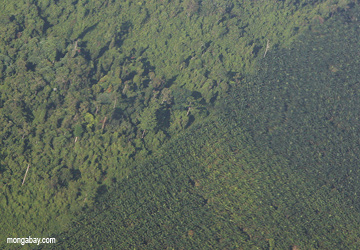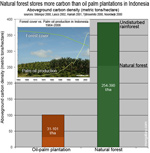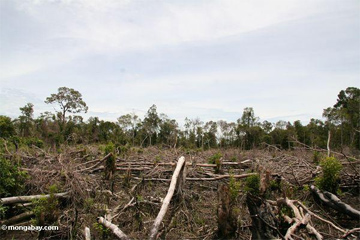A report released by World Growth International in late September claimed that environmentalists are waging a “morally indefensible” campaign against palm oil.
The report accurately highlighted the high productivity of oil palm — the world’s highest-yielding commercial oilseed — and noted that the crop has created jobs and driven rural development in Malaysia and Indonesia. Critically, World Growth also downplayed chief concerns about the rapid expansion of oil palm cultivation across southeast Asia, notably worries that palm oil production is contributing to deforestation, putting endangered wildlife like the orangutan at risk, and adversely affecting climate. To make its case, the report made some questionable claims, asserting that oil palm plantations sequester more carbon than natural forests and that deforestation is driven by poverty rather than industrial activities.
World Growth Report Claim: “Properly run, palm oil plantations are more effective absorbers of CO2 than natural forests”

|
Oil palm plantations do not sequester more carbon than the natural forests. A recent study, conducted at two sites in Sumatra and Kalimantan by scientists at the World Agroforestry Centre (ICRAF), found that mature oil palm plantations store less than 40 tons of above-ground biomass on average over their 25-year lifespan. By comparison logged-over forests at the two sites stored 70-200 tons of carbon per hectare. Untouched forest contains even more carbon, sometimes in excess of 400 tons per hectare.
To portray oil palm in a more favorable light, World Growth ignored carbon storage by natural forests and instead looked at rates of carbon uptake in mature forest versus a newly planted oil palm plantation, which is experiencing rapid tree growth. Sure, newly planted oil palms will absorb carbon at a rapid rate but after 25 years still won’t store anywhere near as much carbon as the natural forest they replaced.
World Growth accurately stated that oil palm does sequester more carbon that other oilseeds like rapeseed and soy but this is hardly a new revelation. A spate of studies published over the past five years have shown that in terms of greenhouse gas emissions, rapeseed, soy, and corn are poor feedstocks for biofuels, as is palm oil when produced at the expense of natural forests and peatlands.
World Growth Report Claim: “The leading cause of deforestation is pressure from the world’s poor, homeless, and hungry who clear land to gather firewood, build shelter, and plant crops for food.”
-
Industrial activities, not subsistence activities, are the leading cause of deforestation. Research by Tom Rudel of Rutgers and Holly Gibbs of Stanford have tracked the fates of cleared forest land and found that cattle ranching, large-scale agriculture and logging — not subsistence agriculture — are the largest drivers of forest conversion. Further, more than half of oil palm expansion in Indonesia and Malaysia since 1990 occurred at the expense of forests. Oil palm expansion in Indonesia and Malaysia has outpaced growth of all other crops since 1995 (chart presented in World Growth’s report).
Malaysia
| Crop | 1995 | 2000 | 2005 | 2008 | Change |
| Oil palm | 2,540 | 3,377 | 4,051 | 4,488 | 1,948 |
| Rubber & coconut | 1,665 | 1,506 | 1,293 | 1,246 | -419 |
Indonesia
| Crop | 1995 | 2000 | 2005 | 2008 | Change |
| Oil palm | 2,025 | 4,158 | 5,454 | 7,008 | 4,983 |
| Rubber & coconut | 7,220 | 7,068 | 7,083 | 7,268 | 48 |
| Other estate crops | 3,681 | 3,874 | 4,363 | 4,766 | 1,085 |
| Rice | 11,439 | 11,793 | 11,839 | 12,327 | 888 |
| Maize & soybeans | 5,129 | 4,325 | 4,248 | 4,593 | -536 |
| Other crops | 2,653 | 2,293 | 2,431 | 2,292 | -361 |
World Growth Report Claim: “However, the palm oil industry, in collaboration with some environmental NGOs, is funding Orang-utan conservation programs and wildlife habitat corridors.”
-
The net impact of oil palm expansion on orangutans has been negative. Millions of hectares of orangutan habitat have been cleared over the past 20 years in the name of palm oil production (some of this, mostly in Indonesia, was never actually planted with oil palm) and when found in plantations, orangutans are commonly persecuted as threats to palm fruit. Orangutan conservation organizations — some of which have been recipients of funding from palm oil companies — say oil palm plantations and clearings from new estates are now a larger source of orphaned orangutans than the illegal pet trade.
The palm oil industry’s recent moves to support orangutan conservation efforts have come in response to intense public scrutiny of its impact on wild apes. The Malaysian palm oil industry has been particularly aggressive in promoting itself as a supporter of orangutan conservation. The CEO of the Malaysian Palm Oil Council, a marketing body, has even claimed that orangutans benefit from living in close proximity to oil palm plantations. But orangutan experts have scoffed at the scoffed at the notion, maintaining that oil palm expansion is one of the greatest threats to orangutans.
Glossing over other issues
 Oil palm plantation and logged-over forest in Borneo. |
World Growth dismissed other prominent environmental concerns, including emissions from conversion of peatlands for plantations (“The scientific work on the extent of the GHG emissions from this practice is still in its infancy… there is a need for further detailed scientific investigations,” it stated, despite a series of studies showing that drainage of peatlands releases carbon through oxidation and increases in likelihood of combustion), and assumed that policy is the same as practice, even in instances where there is clear evidence that landholders are not abiding by the law (“Malaysia has maintained a no burn policy for some time and Indonesian has moved to implement the same policy,” stated the report, even though open burning is still a common problem in both countries.).
World Growth
World Growth International is chaired by Alan Oxley, former Australian Ambassador to the GATT and a member of the Australian Government’s Foreign Affairs Council. Oxley previously served as a lobbyist for Rimbunan Hijau, a Malaysian logging firm that has been widely criticized for human rights abuses and destructive logging practices in Papua New Guinea. Oxley led a public relations campaign to portray Rimbunan Hijau as a responsible forestry company. He has also fought against efforts to limit greenhouse gas emissions (“There is no reasonable certainty that increases in atmospheric carbon dioxide from human activity cause significant global warming,” he wrote in a 2005 editorial) and slow tropical deforestation.
Sustainability
With its high yield, palm oil can be a sustainable crop, but it is not there yet. As long as natural forests continue to be converted for new plantings, palm oil will continue to carry an environmental stigma, one that fairly or unfairly may hurt it in the minds of eco-conscious consumers.
The Roundtable Sustainable Palm Oil (RSPO) — an industry-led initiative to improve palm oil environmental performance — is a step towards more environmentally-friendly palm oil production, but the scheme will fail without credibility provided by transparency and independent monitoring.
Ultimately it is consumers that will determine the fate of RSPO-certified palm oil. If they have faith that certified palm oil (CPO) is indeed sustainable and a willingness to pay a premium for a ‘greener’ product, then CPO may be the most effective means to silence environmental critics.
World Growth report on Palm Oil
Related articles
“Money is not a problem,” palm oil CEO tells conservationists during speech defending the industry
(10/26/2009) Earlier this month at a colloquium to implement wildlife corridors for orangutans in the Malaysian state of Sabah, Dr. Yusof Basiron, the CEO of Malaysian Palm Oil Council (MPOC), told conservationists and primate experts that the palm oil industry was ready to fund reforestation efforts in the corridors. “We can raise the money to replant [the corridors] and keep contributing as a subsidy in the replanting process of this corridor for connecting forests,” Basiron said in response to a question on how the palm oil industry will contribute. “Money is not a problem. The commitment is already there, the pressure is already very strong for this to be done, so it’s just trying to get the thing into motion.”
Emotional call for palm oil industry to address environmental problems

(10/21/2009) During what was at times an emotional speech, Sabah’s Minister of Tourism, Culture, and Environment, Datuk Masidi Manjun, called on the palm oil industry to stop polluting rivers and work with NGOs to save orangutans and other wildlife. He delivered the speech on the first day of an Orangutan Conservation Colloquium held in early October in the Malaysian state of Sabah on the island of Borneo.
Palm oil both a leading threat to orangutans and a key source of jobs in Sumatra

(09/24/2009) Of the world’s two species of orangutan, a great ape that shares 96 percent of man’s genetic makeup, the Sumatran orangutan is considerably more endangered than its cousin in Borneo. Today there are believed to be fewer than 7,000 Sumatran orangutans in the wild, a consequence of the wildlife trade, hunting, and accelerating destruction of their native forest habitat by loggers, small-scale farmers, and agribusiness. Gunung Leuser National Park in North Sumatra is one of the last strongholds for the species, serving as a refuge among paper pulp concessions and rubber and oil palm plantations. While orangutans are relatively well protected in areas around tourist centers, they are affected by poorly regulated interactions with tourists, which have increased the risk of disease and resulted in high mortality rates among infants near tourist centers like Bukit Lawang. Further, orangutans that range outside the park or live in remote areas or on its margins face conflicts with developers, including loggers, who may or may not know about the existence of the park, and plantation workers, who may kill any orangutans they encounter in the fields. Working to improve the fate of orangutans that find their way into plantations and unprotected community areas is the Orangutan Information Center (OIC), a local NGO that collaborates with the Sumatran Orangutan Society (SOS).
Britain bans palm oil ad campaign
(09/09/2009) Britain’s Advertising Standards Authority (ASA), a group that regulates advertisements, has again banned “misleading” ads by the palm oil industry, reports the Guardian. ASA ruled that a campaign run by the Malaysian Palm Oil Council (MPOC) makes dubious claims, including that palm oil is the “only product able to sustainably and efficiently meet a larger portion of the world’s increasing demand for oil crop-based consumer goods, foodstuffs and biofuels.” The ad said criticism over “rampant deforestation and unsound environmental practices” were part of “protectionist agendas” not based on scientific fact. ASA held the ad breached several of its advertising standards codes, including “substantiation,” “truthfulness,” and “environmental claims.” In rebuking the MPOC, the ASA said that the merits of new eco-certification scheme promoted by the palm oil industry is “still the subject of debate” and that the ad’s attacks on detractors implied that all criticisms of the palm oil industry “were without a valid or scientific basis.”
World Bank’s IFC suspends lending to palm oil companies
(09/09/2009) The World Bank has agreed to suspend International Finance Corporation (IFC) funding of the oil palm sector pending the development of safeguards to ensure that lending doesn’t cause social or environmental harm, according to a letter by World Bank President Robert Zoellick to NGOs. A recent internal audit found that IFC funding of the Wilmar Group, a plantation developer, violated the IFC’s own procedures, allowing commercial concerns to trump environmental and social standards. The findings were championed by environmental and indigenous rights’ groups who have criticized World Bank support for industrial oil palm development which they say has driven large-scale destruction of forests in Indonesia, boosting greenhouse gas emissions, endangering rare and charismatic species of wildlife, including the orangutan, and displacing forest communities.
Biofuels 200 times more expensive than forest conservation for global warming mitigation
(08/27/2008) The British government should end subsidies for biofuels and instead use the funds to slow destruction of rainforests and tropical peatlands argues a new report issued by a U.K.-based think tank. The study, titled “The Root of the Matter” and published by Policy Exchange, says that “avoided deforestation” would be a more cost-effective way to address climate change, since land use change generates more emissions than the entire global transport sector and offers ancillary benefits including important ecosystem services.
Corporations become prime driver of deforestation, providing clear target for environmentalists
(08/05/2008) The major drivers of tropical deforestation have changed in recent decades. According to a forthcoming article, deforestation has shifted from poverty-driven subsistence farming to major corporations razing forests for large-scale projects in mining, logging, oil and gas development, and agriculture. While this change makes many scientists and conservationists uneasy, it may allow for more effective action against deforestation. Rhett A. Butler of Mongabay.com, a leading environmental science website focusing on tropical forests, and William F. Laurance of the Smithsonian Tropical Research Institute in Panama believe that the shift to deforestation by large corporations gives environmentalists and concerned governments a clear, identifiable target that may prove more responsive to environmental concerns.
Half of oil palm expansion in Malaysia, Indonesia occurs at expense of forests
(05/20/2008) More than half of the oil palm expansion between 1990 and 2005 Malaysia and Indonesia occurred at expense of forests, reports a new analysis published in the journal conservation Letters. Analyzing data from the United Nations Food and Agriculture Organization, Lian Pin Koh and David S. Wilcove of Princeton University found that 55-59 percent of oil palm expansion in Malaysia and at least 56 percent of that in Indonesia occurred at the expense of forests. Given that oil palm plantations are biologically impoverished relative to primary and secondary forests, the researchers recommend restricting future expansion to pre-existing cropland and degraded habitats.
Oil palm does not store more carbon than forests

(11/08/2007) Officials from the Indonesian ministry of agriculture and the palm oil industry are distributing materials that misrepresent the carbon balance oil palm plantations, according to accounts from people who have seen presentations by members of the Indonesian Palm Oil Commission. Ministry of agricultural officials are apparently arguing that oil palm plantations store and sequester many times the amount of CO2 as natural forests and therefore converting forests for plantations is the best way to fight climate change. In making such claims, these Indonesian officials are ignoring data that show the opposite, putting the credibility of the oil palm industry at risk, and undermining efforts to slow deforestation and reign in greenhouse gas emissions.
Eco-friendly palm oil could help alleviate poverty in Indonesia
(04/03/2007) The Associated Press (AP) recently quoted Marcel Silvius, a climate expert at Wetlands International in the Netherlands, as saying palm oil is a failure as a biofuel. This would be a misleading statement and one that doesn’t help efforts to devise a workable solution to the multiplicity of issues surrounding the use of palm oil.
Why is palm oil replacing tropical rainforests?
(04/25/2006) In a word, economics, though deeper analysis of a proposal in Indonesia suggests that oil palm development might be a cover for something more lucrative: logging. Recently much has been made about the conversion of Asia’s biodiverse rainforests for oil-palm cultivation. Environmental organizations have warned that by eating foods that use palm oil as an ingredient, Western consumers are directly fueling the destruction of orangutan habitat and sensitive ecosystems. So, why is it that oil-palm plantations now cover millions of hectares across Malaysia, Indonesia, and Thailand? Why has oil palm become the world’s number one fruit crop, trouncing its nearest competitor, the humble banana? The answer lies in the crop’s unparalleled productivity. Simply put, oil palm is the most productive oil seed in the world. A single hectare of oil palm may yield 5,000 kilograms of crude oil, or nearly 6,000 liters of crude.
